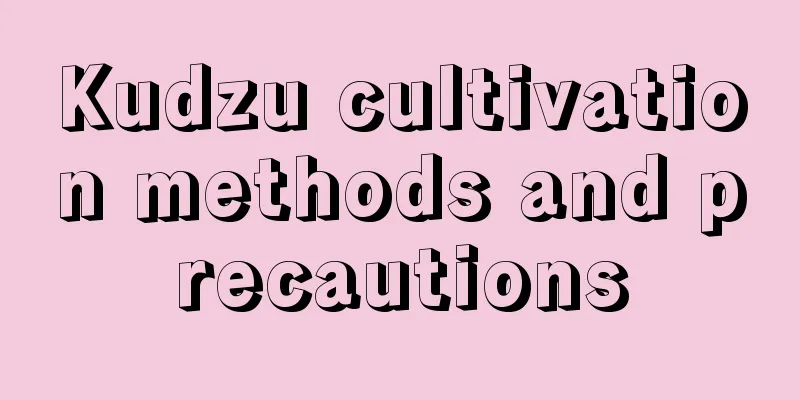Kudzu cultivation methods and precautions

1. Maintenance methods1. Light management: During the maintenance process, try to place it in a sunny environment, because the plant likes sunlight and warmth. 2. Substrate selection: Kudzu has strong adaptability and is mostly distributed in the wild on sunny and moist hillsides and along woodland roadsides. The soil you prepare should preferably be loam or sandy loam that is well drained and relatively loose. 3. Nutrient management: Kudzu prefers a fertile soil environment, so during the cultivation process, try to keep the nitrogen, phosphorus and potassium content in the soil sufficient. 4. Temperature management: It likes warm and humid environment and has a certain degree of cold and drought resistance. The suitable temperature for seed germination is around 20℃, and it can germinate at 15-30℃. It usually germinates 4 days after sowing. 2. Breeding techniques1. Summer: The temperature should be kept at 15-30 degrees Celsius in summer. If placed indoors, it is necessary to keep it well ventilated and avoid direct sunlight in hot summer. 2. Repotting: Because it is a shrub-like vine, it is recommended to plant it in a larger pot. It is best to loosen the soil every month to keep the pot ventilated. Do not damage the roots when repotting. Remove it from the pot and simply trim the roots before planting it in a new pot. 3. Problem diagnosis and treatment1. Yellowing leaves: If yellowing leaves occur, it is most likely caused by fertilization. Too much fertilizer can easily burn the roots and cause the leaves to turn yellow. 2. Pests: There are few diseases in kudzu. During the growing period, crickets, beetles and other pests mainly damage the stems and leaves. Crickets can be killed by spraying 2000 times diluted 80% DDT emulsion, and beetles can be killed by spraying 1000 times diluted 90% crystal trichlorfon on the leaves in May and June. Other pests can be controlled with malathion, chlorpyrifos, etc. IV. Other issues1. Is it toxic? Wild kudzu is a non-toxic plant, so even if it is grown in a potted plant, it will not cause any harm. 2. Pruning and maintenance: Because it is highly adaptable, there is no need to prune its branches and leaves regularly. Usually, if the plant is very dense, regular pruning is sufficient, just removing the branches and leaves that affect its growth. |
<<: Breeding methods and precautions of pineapple
>>: Cultivation methods and precautions of annual holly
Recommend
What should I do if the leaves of azalea are dry and fall off when touched?
1. Shading If azalea is exposed to the sun for a ...
What flowers are good for beginners
1. Chlorophytum Chlorophytum is an easy-to-grow p...
What is the best month to plant plum beans?
When to plant plum beans Snap beans, also known a...
What month is suitable for planting lotus root?
When to plant lotus root Lotus roots are generall...
How to grow nectarines
1. Maintenance methods 1. Temperature: It is best...
Osmanthus grafting method
The main purpose of grafting osmanthus is to solv...
What flowers are suitable for growing in Shenzhen?
1. Shenzhen’s climate characteristics Shenzhen ha...
When is the best time to plant zinnias?
1. Planting time Generally speaking, March to Jun...
The efficacy and function of sorghum
1. Antidiarrhea Sorghum contains tannic acid and ...
The flower language and legend of wolfberry
The flower language of wolfberry What we see most...
How to reproduce small lilies
Seed propagation The propagation of lilies is mos...
Even though the roots were rotten like this, they were still able to survive! How it was done
Clivia root rot 1. Remove the Clivia with rotten ...
How to prune ginkgo bonsai
When to prune ginkgo Ginkgo bonsai is mainly prun...
The correct way to fertilize orchids and what fertilizer to use (what is the best household fertilizer for growing orchids)
How to fertilize orchids grown on the balcony 1. ...
How to grow Mimosa
1. Breeding conditions 1. Soil: Mimosa likes to g...









